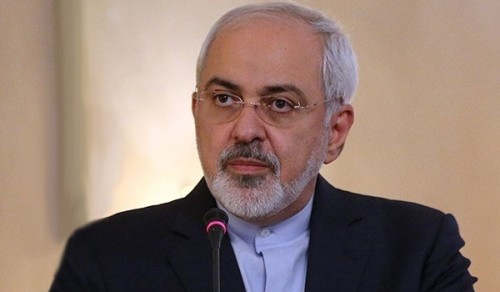LATEST
Continuing its PR campaign before nuclear talks with the 5+1 Powers resume on Monday in New York, Iran has told the Obama Administration to resolve its internal political problems so a deal can be completed.
Iranian Foreign Minister Mohammad Javad Zarif (pictured) told reporters on Sunday, as he arrived for a UN meeting on the Nuclear Non-Proliferation Treaty:
We consider the US administration responsible for implementing the agreement.
Internal problems and conflicts in the US are not related to us and to the implementation of the agreement. Based on international law, the countries’ internal problems don’t exempt them from implementing their undertakings and this is the main framework that we attach importance to.
Zarif will lead the Iranian delegation in today’s talks, which may also include US Secretary of State John Kerry, European Union foreign policy chief Federica Mogherini, and other Foreign Ministers from the 5+1 (US, Britain, France, Germany, Russia, and China).
Talks are likely to focus on the timing of the removal or suspension of UN, US, and European Union sanctions, while confirming the limits on Iran’s enrichment of uranium. The two sides are seeking a final agreement by a June 30 deadline.
The White House has faced Congressional insistence that legislators approve any comprehensive deal. Earlier this month, a compromise allowed a 30-day review period for consideration of the full text, while avoiding — as with a treaty — a formal vote on the agreement.
Rouhani Revives Challenge Over Policing of Social Behavior
President Rouhani has revived his challenge to policing of social behavior, such as the wearing by women of hijab.
Rouhani told a meeting of security force commanders on Saturday, “The police are not responsible for executing Islam, they are charged with the execution of the law, and any other expectation would create confusion and cause problems for the people.”
The President’s comments are likely to renew a battle with others in the Iranian establishment over enforcement of laws over “improper” behavior.
Rouhani told an audience last May, “One cannot take people to heaven through force and a whip.” Criticized by hardliners, he responded:
They have no work, no profession, they are with delusions. They are incessantly worried about people’s religion and the afterlife. They know neither what religion is nor the afterlife, but they’re always worried.
See Iran Feature: Rouhani Hits Back at “Delusional” Hardliners Over “Heaven’s Whip”
However, concentrating on nuclear talks and economic challenges, the President held back from any substantive measures to ease the enforcement.
In the autumn, controversy over the policing was stoked when a series of women had acid thrown in their faces, apparently over supposed fashion transgressions.
Rouhani’s latest remarks have already denounced by three Grand Ayatollahs — Makarem Shirazi, Nouri Hamedani, and Safi Golpayegani — as an offense to Islam. Makarem Shirazi said:
Everyone, including the police and others have a duty to enforce the Islamic rules, even, commanding right and forbidding wrong is a public duty, according to the commands of the Qur’an….
Our country’s laws are all originated from Islam and everyone, including the police and others have a duty to implement Islam.
I hope that [President Rouhani] accepts my friendly advice and not to repeat such words again.

